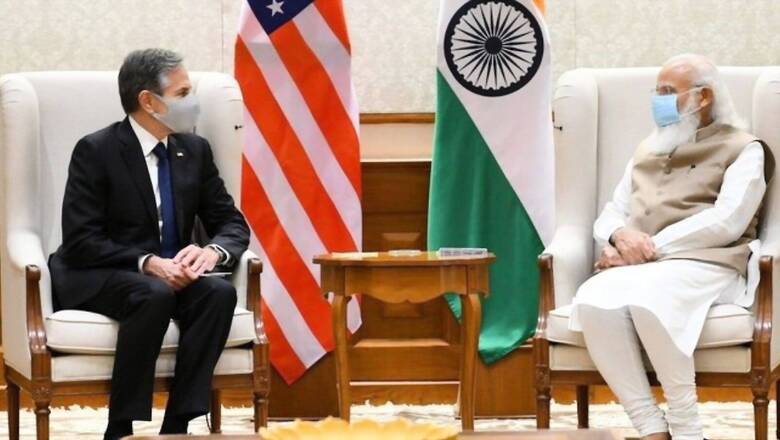
views
The sudden and unexpected announcement of the Australia-UK-US (AUKUS) defence pact has shaken up the political and security scenario in the Indo-Pacific. The US decision to supply nuclear powered submarines to Australia is a momentous one, as this is the first time since 1958 when it shared submarine nuclear technology with the UK that this is being done.
The UK case is different from Australia’s. The UK conducted its first nuclear weapons test in 1952 and became a recognised nuclear weapon power under the NPT (Treaty on the Non-Proliferation of Nuclear Weapons). It already possessed a nuclear technology base when it received nuclear propulsion technology, and had some local capacity to manage the associated complexities. This US-UK cooperation also took place in the context of the Cold War and special US-UK ties.
Australia’s case is different. It has no nuclear technology base, and is a non-nuclear weapon state under the NPT. This entitles it to civilian nuclear technology under IAEA (International Atomic Energy Agency) safeguards, but military related nuclear technology presents a special problem. More so as the US nuclear submarines use weapons-grade uranium as fuel, whereas the French ones (and Russian as well as Indian), use low-enriched uranium (20 per cent). The US, UK and Australia have already informed the IAEA which will engage with them on this matter in line with its statutory mandate, and in accordance with their respective safeguards agreements with the Agency. (Interestingly, Brazil is already constructing a nuclear powered submarine with French assistance, which is planned to come into operation in 2029. South Korea too has plans to develop one. Iran has made it known in 2020 that developing its own nuclear powered submarine is a top priority).
Australia as a military ally of the US has some kind of a “special relationship” with it in the context of the “Five Eyes” intelligence arrangement between the Anglophone/Anglo-Saxon countries (US, UK, Australia, Canada and New Zealand). The Cold War decision that led the US to share nuclear propulsion submarine technology with the UK is being repeated in the background of a new “Cold War” in the making between the US and China, even though this phrase to describe the state of US-China ties is officially played down.
ALSO READ | AUKUS Postscript: France Could Help India with Nuclear Attack Submarine Technology
The new defence pact goes beyond nuclear propulsion technology and covers under water technologies, including protecting underwater sea cables, cybersecurity, Artificial Intelligence (AI) quantum computing, sea- and air-launched missiles, and so on. In other words, it is to build Australia as a significant military power intimately tied to the US in the decades ahead. Apart from its aggressive policies in the South and East China Seas and towards Taiwan, China has been crassly bullying Australia and has sanctioned it economically. Even as Australian opinion is divided over the policies to pursue towards the US and China, with worries about the economic costs of confrontation with China and reluctance to become a pawn in America’s China-related policies, the latest defence pact with the US and the UK transcends this internal debate and sets a course for Australia to be a more robust partner in curbing China’s expansionism and hegemonic policies in the Indo-Pacific.
Implications for Quad, ASEAN
This new defence pact serves India’s interests in so far as it is intended to counter China’s efforts to exercise control over the South China Sea, dominate Asia and achieve its time-table for becoming the world’s leading power on the assumption that its rise is inexorable and cannot be challenged. We are ourselves victim of China’s territorial expansionism and policies to subvert our strategic interests through Pakistan. China seems to have underestimated the reaction of other powers to its belligerence.
India had doubts earlier about where Australia positioned itself against China and what it could really contribute to Indo-Pacific security in material terms, which is the reason why Australia was for long not invited to join the Malabar Exercise. Those doubts had been overcome lately with good political understandings reached at the leadership level. With the new defence partnership announced aimed at building Australia’s military capacity in the maritime domain in particular, the value of what Australia brings to the table eventually would be meaningful. The political message to China has already been registered.
Beyond this larger perspective in our favour, questions arise with regard to the impact of Australia’s militarisation, especially in the nuclear domain, on ASEAN. Will ASEAN (Association of Southeast Asian Nations) which has had doubts about a US-China confrontation and is against being put in a position of having to choose between the US and China be comfortable with this deepening of the US-Australia axis, along with the UK, directed at China? Indonesia has expressed cautious concern about AUKUS, about an arms race and projection of military power in the region. The Malaysian Prime Minister too has echoed concerns that AUKUS could provoke other powers to act more aggressively in the region, especially in the South China Sea. Singapore has been positive, while Philippines has adopted a neutral stance. To what extent AUKUS undermines the centrality of ASEAN in shaping security in the Indo-Pacific region will be on the ASEAN mind. Its impact on the ASEAN Regional Forum and the East Asia Summit will need to be studied in the period ahead.
AUKUS has also to be seen in the context of the Quad. In a wider perspective it can be seen as complementary to the Quad in some ways, in the sense that Quad is not a military alliance, and will not be one because India sees it as a group in which like-minded countries come together to address specific concerns and have an agenda of cooperation that goes beyond one of security alone. The first virtual Quad summit covered areas such as maritime security, quantum computing, AI, 5G, cybersecurity, production of anti-COVID vaccine and climate change.
ALSO READ | China is the Big Agenda at Quad Summit, All Eyes Will be on India and Japan
AUKUS seems to be primarily confined to defence issues, though it does include quantum computing, AI, cybersecurity etc. To what extent the US, Australia and the UK will pay priority attention to pursuing the latter issues amongst themselves in order to maintain a lead in these technologies of the future, rather than pursue them with equal vigour within the purview of Quad, which excludes the UK, remains to be seen. The announcement of AUKUS before the Quad in-person summit on September 24 no doubt dilutes the impact that the summit will otherwise have had, as it is not the only game now in town to address the China challenge. In strictly security terms, AUKUS overshadows the Quad.
Maritime Security of Indo-Pacific
The bitter controversy over the manner in which France has been ousted by the US, Australia and the UK from a signed contract to produce 12 diesel electric submarines specially tailored for Australian needs with major transfer of sensitive technologies has complicated the political atmosphere surrounding the Indo-Pacific concept. The France-Australia expanding strategic ties, coupled with the deepening India-France strategic ties, was a plus factor in forging shared approaches to maritime security in the Indo-Pacific region, in particular because of French territories in the Pacific and Australia’s own concerns about Chinese activism in the region. This has got reflected in the establishment of the trilateral India-Australia-France dialogue, which will be suspended. Already, the meeting of the foreign ministers of the three countries planned during the forthcoming UNGA session has been called off. Only the Indian and French foreign ministers will now meet.
France, which is a big votary of Europe’s strategic autonomy, has been advocating expansion of EU’s defence-related capacities to reduce dependence on the US. After the Biden administration’s chaotic withdrawal from Afghanistan and refusal to heed European appeals to delay it to allow the Europeans to evacuate their own nationals in security, the reactions in Europe have been very adverse. Now, with the deep rebuff France has received at the hands of the Americans and the unprecedented French step to recall its ambassador from Washington for consultations, as well as the harsh words used by the French foreign minister to decry the conduct of the Americans and the Australians against an ally indicate a rise of strains in the EU-US relations and even within NATO where France has been recalcitrant in the past.
The EU has just announced its Indo-Pacific strategy. The impact of France-US tensions will not be in favour of working for more cooperative US and EU strategies in the Indo-Pacific region, given France’s key position in the EU and its position as the only EU country which has the interests and capacities to pursue a robust Indo-Pacific strategy. France has accused the UK of “permanent opportunism” and referred to it contemptuously as a “fifth wheel” in the rescinded France-Australia contract. This does not bode well for collaboration between France/EU and the UK in the Indo-Pacific where the UK now intends to play a stronger role.
China has, expectedly, reacted sharply to AUKUS, and though it will seek to exploit the signs of disarray in the western alliance in the Indo-Pacific, its security environment is worsening. It will have to cope with US nuclear submarines, eventually the Australian ones, and Indian as well. As they say, as you sow, so shall you reap!
The author is Former Foreign Secretary. He was India’s Ambassador to Turkey, Egypt, France and Russia. The views expressed in this article are those of the author and do not represent the stand of this publication.
Read all the Latest News , Breaking News and Ukraine-Russia War Live Updates here.



















Comments
0 comment